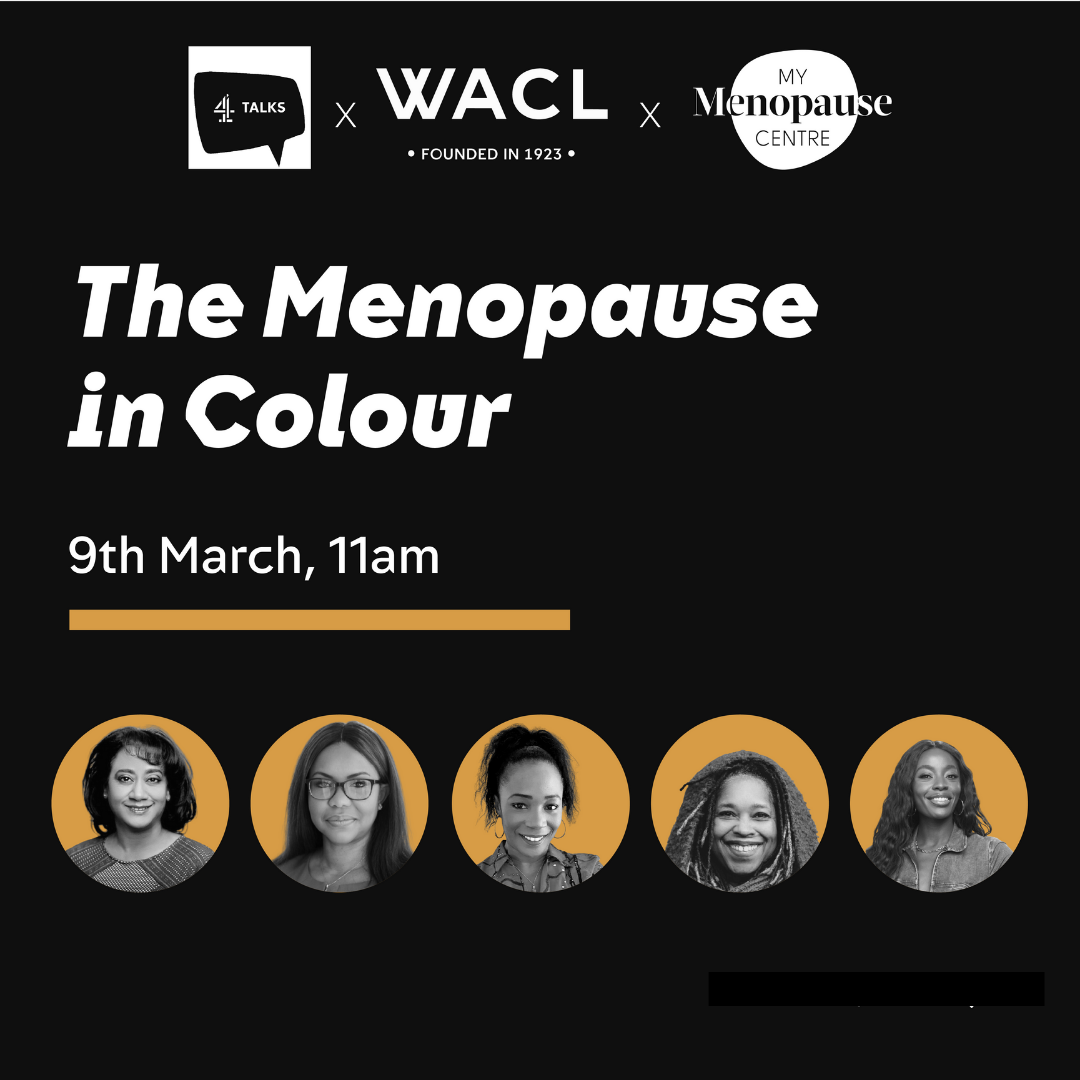
WACL’s The Menopause in Colour event, 9th March 2022
Channel 4 Agency Sales Manager Maria St Louis: “There’s a real need for safe spaces for open conversation, and education”
Panellists at WACL discussion call for raised awareness of menopause and treatment options among women of colour during discussion of the importance of intersectionality when tackling menopause within the workplace
The adverse impacts of menopause – including the physical and cognitive symptoms 75% of menopausal women experience, which will likely be severe if not incapacitating for 25% of this group – are often even harder for women of colour, those attending WACL’s The Menopause of Colour event heard.
Tanya Joseph, Group Managing Director, Corporate Affairs at Hill & Knowlton Strategies and WACL Executive Member explained: “Often, women of colour – particularly those of African and Caribbean descent – will feel like their normal day to day experience of the health service can sometimes be quite negative.
“We know you are less likely to be treated in the same way as white women, less likely to believed, our symptoms more likely to be dismissed. And we can think I am not going to seek medical attention or, if I do go, my experience won’t really be understood. We have dark skin and our skin ages less rapidly than our white girlfriends’. Sometimes, GPs think ‘She can’t be menopausal because she looks too young’ and, while that’s great, it also means symptoms can sometimes be dismissed.”
She continued: “When we think of socio-economic groups, we know women of colour are more likely to work in low paid jobs and find it harder to take time off work, so when it comes to those physical manifestations of the menopause the burden will fall on those women because they don’t necessarily have sympathetic employers where sick leave is not a problem and you can just take time off.
“Their employers are unlikely to have menopause policies, too. Then there’s the added concern that we are more likely to live and have broader caring responsibilities as part of that typical sandwich generation, looking after our children and our parents, which means we give finding time to look after ourselves is often given a low priority and we often can think of it as indulgent. We really need to be better at looking after ourselves.”
Menopause expert Dr Tonye Wokoma of the My Menopause Centre added: “Fibroids – a tumour of the muscle of the womb – is more common in black and Asian women of ethnic minority and can grow more rapidly though we don’t know exactly. As (these) women go enter perimenopause approaching menopause, their periods can get heavier and become irregular, and they may well have more troublesome symptoms from their periods as well.”
Like all women, women of colour suffer from the stigmatisation of menopause – and menopausal women – which still prevents too many people, women and men alike, from understanding what women are experiencing, talking about it with friends and colleagues, and accessing the array of advice and support that is available.
Channel 4 Agency Sales Manager Maria St Louis said: “There’s a real need for safe spaces for open conversations, and education, about menopause and other elements of women’s lives – not just in the 40s, 50s and 60s but also earlier. Because ultimately, in the workplace, menopause doesn’t just affect one woman but a team. (So) culture is critical, as is an understanding that this is about gender equality.”
Employers can help all women as they go through the menopause in many ways.
“The primary thing is having a policy for women when they are going through menopause so when they have conversations with their managers, they can draw on a policy that’s legally binding so goes beyond simply having guidelines,” she added. “But beyond that, once a policy is in place it has to be lived out within the values of the organisation. It should be seen as part of a culture of equality and inclusivity that’s there from the moment a woman joins.”
It’s also up to the individual to be as informed as they can be, Dr Wokoma said.
“Knowledge is power, and there are all sorts of things you can do to manage this period of life. It’s not just about having meds, it’s about lifestyle – the complete picture, lifestyle changes, exercise, diet are all crucially important when it comes to how menopause impacts each individual. Then there’s (the knowledge you need about) hormone treatments you can have and, also, about the non-hormonal treatments available for those who don’t want hormone treatments.”
She continued: “It’s about finding the right support wherever you are on this journey. Every woman is individual, and you need someone who can personalise your care and give you the right advice.”
Pamela Windle, women’s health coach and Founder of Smarter Change agreed, adding: “Firstly, a woman must have real understanding of what’s happening in her body, the role of her hormones, and the importance of her menstrual cycle as a little window on what’s happening with your body.
“There will be tell-tale signs of a hormonal shift that might not be debilitating but signal you are heading towards that transition before it happens. Become your own detective. Keep a diary. Record your menstrual cycle – for your mood, energy levels, immune system. This will empower you to have important – sometimes uncomfortable – conversations with your loved ones about what help you need and then conversations in the workplace around how to do what you do but, during menopause, may need to do it slightly differently.”
Joseph endorsed this.
“An important part of normalising this thing that half the population will experience firsthand at some point is to address the stigma around being menopausal and or seen as stupid, incapable, or past it. We need to remind ourselves and a family and colleagues that, ideally, we will have completed menopause by our late 50s and we still have a lot of life to live after that,” she said.
“We need to think of the years that follow as the start of a new beginning – a different kind of life not a negative thing – and remember that though symptoms can be difficult for lots of women, we will get through it with the right help and support. Those of us who are going through it or have gone through it need to speak out and be a bit more loud and proud about it to force conversations about it.”
The communications and advertising sector has a massive part to play given its power to shape thinking and influence.
“It’s about (communications and advertising) not presenting post-menopausal women as past it and it being all about incontinence pads and stair lifts and ensuring older women – which in advertising often means women over 40 – are vibrant, economically active, have money, and time: all things younger audiences don’t have,” Joseph concluded.
“Think about periods – there’s no stigma talking about that now. We need that same openness around menopause and all women, especially women of colour, need to remember: we are the global majority.”
